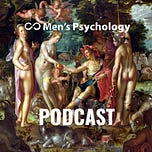For more from Men’s Psychology, and full access to this entire course, upgrade here:
SHOW NOTES:
The passage discusses the aim of establishing a body of knowledge called "masculine intelligence" through various programs. Instead of relying on a panel of elders, the goal is to provide men with mentors or heroes who can serve as sources of inspiration and guidance.
These mentors can be individuals like Michael Jordan, Bill Gates, or Warren Buffett, who possess qualities that resonate with one's own identity and values. By studying the lives and decisions of these heroes, individuals can learn valuable lessons and make decisions that align with their own aspirations.
The envisioned body of knowledge would help individuals view their challenges as initiation experiences, enabling personal growth and the ability to overcome obstacles, including the condition of depresculinity.
It is emphasized that fear is a common element in these initiation experiences, and men are called upon to develop skills and execute competencies in response to these challenges.
The passage discusses the concept of execution and the notion of a "killer instinct" in men. It suggests that men possess a natural instinct to excel and achieve results, often associated with the Greek god of war, Ares.
While today's society prohibits physical violence, the passage argues that this instinct still exists and needs to be acknowledged and harnessed.
It proposes that one way to channel this instinct is through setting boundaries and making decisions that prioritize one's own goals over the desires of others. By disappointing or saying no to others, men are symbolically "killing" their dreams for the sake of their own success.
This approach is considered utilitarian and believed to benefit society by allowing the best individuals to succeed. The passage also highlights examples of setting boundaries within personal relationships, even if it means disappointing loved ones in order to achieve desired outcomes. The ultimate objective is to assert one's will and achieve favorable results, even if initial resistance is encountered.
The passage discusses the difference between two types of anxiety: "boy anxiety" and "Man Anxiety." Boy Anxiety is described as crippling and paralyzing, while Man Anxiety is characterized by courage and heightened senses that don't hinder action.
The passage suggests that courage is a key aspect in overcoming panic attacks. It emphasizes the importance of shifting focus from fear and negative thoughts to mining negative experiences for skills, lessons, and strategies that can be used to confront future challenges. By doing so, individuals can come out of difficult experiences with new abilities, reduced fear, and improved ability to act with heightened senses.
The passage also mentions the upcoming exploration of the neuroscience and psychology behind depresculinity, attributing this condition to the mammalian and reptilian parts of the mind. Finally, the passage ends with a question about discipline and goal-setting in relation to personal experiences.
For more from Men’s Psychology, and full access to the entire Depresculinity course, by upgrading here:














Share this post